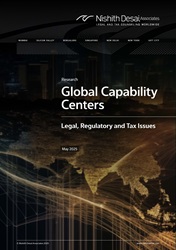|
Global Capability Centers
Legal, Regulatory and Tax Issues
May 28, 2025

In today’s interconnected and globalised world, where businesses aspire to be location-agnostic, there
is an increasing trend of entities developing multinational, cross-border capabilities, operating round-the-
clock and generating value across time zones. This paradigm shift has led to the rise of Global Capability
Centres (“GCC”), especially in emerging economies, which have helped drive business operations worldwide.
India has played a pivotal role in the growth and evolution of GCCs. Early breakthroughs in IT services,
offshoring, and R&D hubs earned the trust of leading global corporations, paving the way for Indian GCCs
to evolve into strategic nerve centres at the forefront of innovation, digital transformation, and enterprise
growth. Currently, GCCs contribute over 1% of India’s GDP and are projected to generate more than USD
100 billion in annual revenue by 2030.
With strategic investments in infrastructure, digital capabilities, and a growing pool of highly skilled
professionals, India is increasingly being seen as a global epicentre for technological and R&D services.
The country’s advantage is further enhanced by its rich ecosystem of start-ups, government-backed initiatives like “Make in India” and “Digital India,” and a time-zone benefit that facilitates 24/7 operations.
However, as the number and scope of GCCs grow, it becomes increasingly important to examine the legal,
regulatory, and policy landscape that governs these entities and their operations. Structuring and contracting GCCs in India involves navigating a complex web of laws, including corporate compliance, tax regulations, intellectual property rights, environmental laws, labour laws, and data protection frameworks. These legal considerations often present challenges, both for foreign companies establishing GCCs in India and for existing entities seeking to expand their operations.
This paper aims to provide a detailed overview of the GCC ecosystem in India, with a focus on the structural, contractual, and legal frameworks that impact their operations. It analyses the key legal areas and the obligations these regulations impose on GCCs. It further examines how these challenges can be addressed through targeted policy measures that encourage the continued development of GCCs in India.
Please click
here to access our paper.
Regards,
Ankit Mishra,
Pradyumn Sharma,
Morvi Chaturvedi,
Santosh Gangavati,
Hetal Pandya,
Aaron Kamath and
Huzefa Tavawalla
For any help or assistance, please
email us on
concierge@nishithdesai.com.
Do visit us at
www.nishithdesai.com.
Disclaimer
The contents of this hotline should
not be construed as legal opinion. View detailed disclaimer.
This hotline does not constitute a
legal opinion and may contain information generated
using various artificial intelligence (AI) tools or
assistants, including but not limited to our in-house
tool,
NaiDA. We strive to ensure the highest quality and
accuracy of our content and services. Nishith Desai
Associates is committed to the responsible use of AI
tools, maintaining client confidentiality, and adhering
to strict data protection policies to safeguard your
information.
This hotline provides general information
existing at the time of preparation. The Hotline is
intended as a news update and Nishith Desai Associates
neither assumes nor accepts any responsibility for any
loss arising to any person acting or refraining from
acting as a result of any material contained in this
Hotline. It is recommended that professional advice
be taken based on the specific facts and circumstances.
This hotline does not substitute the need to refer to
the original pronouncements.
This is not a spam email. You have
received this email because you have either requested
for it or someone must have suggested your name. Since
India has no anti-spamming law, we refer to the US directive,
which states that a email cannot be considered spam
if it contains the sender's contact information, which
this email does. In case this email doesn't concern
you, please
unsubscribe from mailing list.
 |
|
We aspire
to build the next generation
of socially-conscious lawyers
who strive to make the world
a better place.
At NDA, there
is always room for the right
people! A platform for self-driven
intrapreneurs solving complex
problems through research, academics,
thought leadership and innovation,
we are a community of non-hierarchical,
non-siloed professionals doing
extraordinary work for the world’s
best clients.
We welcome
the industry’s best talent -
inspired, competent, proactive
and research minded- with credentials
in Corporate Law (in particular
M&A/PE Fund Formation),
International Tax , TMT and
cross-border dispute resolution.
Write to
happiness@nishithdesai.com
To learn more
about us
Click here.
|
|
Top Tier
Law Firm:
Chambers & Partners,
Legal 500, Benchmark
Litigation, Asialaw,
IFLR1000, ITR World
Tax, Who’s
Who Legal, Asian
Legal Business (Thomson
Reuters), India
Business Law Journal,
Mergermarket
Recognised
Practices:
International Tax,
Private Equity,
Corporate/M&A,
Venture Capital,
Investment Funds,
International Dispute
Resolution: Arbitration
and Litigation,
White-Collar Crime &
Corporate Investigations,
Data Compliance &
Cybersecurity, Internet &
e-Commerce, HR and
Employment Law,
Intellectual Property,
Cross-Border Capabilities,
High Net Worth and
Private Wealth Law,
Insolvency
Recognised
Sectors:
Technology and Telecommunications,
Media and Entertainment,
Life Sciences and
Healthcare, Investment
Funds, FinTech,
Financial Services,
Sports & Gaming,
Transport, Government
and Regulatory
Innovation
Leadership:
RSG Financial Times –
India’s Most
Innovative Law Firm
(2019, 2017, 2016,
2015, 2014), Legal500
Innovative Law Firm
of the Year 2025
|
|
|
|

